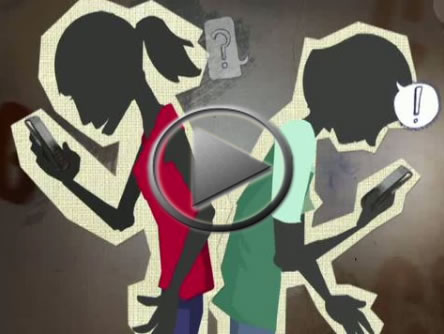Cyberbullying is the willful and repeated use of electronic communication technologies to harass, intimidate or threaten others. Instant messaging, email and social media sites are commonly used to cyberbully. Cruel , demeaning, and threatening information can be broadcast right into the victims homes, to a wider audience, and faster than ever before.
Cyberbulling is usually not a one time occurence but constant harrassment. Because of the constant role technology plays in our lives, it is often difficult for victims to escape from a cyberbullies.
from ConnectSafely.org
- Don't respond. If someone bullies you, remember that your reaction is usually exactly what the bully wants. It gives him or her power over you. Who wants to empower a bully?
- Don't retaliate. Getting back at the bully turns you into one and reinforces the bully's behavior. Help avoid a whole cycle of aggression.
- Talk to a trusted adult. You deserve backup. It's always good to involve a parent but - if you can't - a school counselor usually knows how to help. Sometimes both are needed. If you're really nervous about saying something, see if there's a way to report the incident anonymously at school. Sometimes this can result in bullies getting the help they need to change their behavior.
- Save the evidence. The only good news about digital bullying is that the harassing messages can usually be captured, saved, and shown to someone who can help. Save evidence even if it's minor stuff - in case things escalate.
- Block the bully. If the harassment's coming in the form of instant messages, texts, or profile comments, do yourself a favor: Use preferences or privacy tools to block the person. If it's in chat, leave the "room."
- Be civil. You're doing yourself a favor. Even if you don't like a person, it's a good idea to be decent and not sink to his or her level. Research shows that gossiping about and "trash talking" others increase your risk of being bullied.
- Don't be a bully. You know the old saying about walking a mile in someone's shoes; even a few seconds of thinking about how another person might feel can put a big damper on aggression. That's needed in this world.
- Be a friend, not a bystander. Forwarding mean messages or just standing by and doing nothing empowers bullies and hurts victims even more. If you can, tell bullies to stop, or let them know bullying is not cool - it's cruel abuse of fellow human beings. If you can't stop the bully, at least try to help the victim and report the behavior.
Cyberbullying Information and resources from the National Crime Provention Council to curb the growing problem of cyberbullying.
NetSmartz.org Cyberbullying and internet safety resources from the National Center for Missing and Exploited Children.

NetCetera - Stand Up to Cyberbullying
